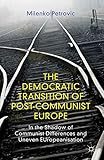The democratic transition of post-communist Europe : in the shadow of communist differences and uneven EUropeanisation / Milenko Petrovic.
Material type: TextPublisher: Houndmills, Baskingstoke, Hampshire ; New York, NY : Palgrave Macmillan, 2013Description: xx, 196 pages ; 23 cmContent type:
TextPublisher: Houndmills, Baskingstoke, Hampshire ; New York, NY : Palgrave Macmillan, 2013Description: xx, 196 pages ; 23 cmContent type: - text
- unmediated
- volume
- 9780230354319 (hardback)
- 20150900
- Post-communism -- Europe, Eastern
- Democratization -- Europe, Eastern
- Europe, Eastern -- Politics and government -- 1989-
- Europe, Eastern -- Foreign relations -- European Union countries
- European Union countries -- Foreign relations -- Europe, Eastern
- POLITICAL SCIENCE / Political Ideologies / Communism & Socialism
- POLITICAL SCIENCE / Political Ideologies / Democracy
- POLITICAL SCIENCE / Political Process / General
- POLITICAL SCIENCE / Economic Conditions
- POLITICAL SCIENCE / Government / National
- 320.947
- JN 96 P497d 2013
- POL005000 | POL007000 | POL016000 | POL023000 | POL030000
| Item type | Current library | Home library | Collection | Shelving location | Call number | Vol info | Copy number | Status | Date due | Barcode |
|---|---|---|---|---|---|---|---|---|---|---|
 Libro
Libro
|
Biblioteca Juan Bosch | Biblioteca Juan Bosch | Ciencias Sociales | Ciencias Sociales (3er. Piso) | JN 96 P497d 2013 (Browse shelf(Opens below)) | 1 | 1 | Available | 00000113298 |
Includes bibliographical references (p. 169-184) and index.
"Tracing both economic and political developments through the prism of history as well as more recent events, this book casts new light on the role of communist history in setting the different regional successes in post-communist transition. It challenges the dominant view that all communist systems were the same, and differing from existing books on the subject, it provides a full account of how certain variations in the functioning of the communist political and socio-economic systems in East Central Europe and the Balkans defined the different modes of power transfer of states in the two regions and their subsequent pathways following the fall of communism. The author also develops a new angle on national and regional post-communist pathways by exploring varying levels of success in both post-communist political and economic reforms as well as the ability of particular states to (re)establish close political ties with the West, especially the EU, and secure necessary foreign assistance for post-communist reform. Unobtrusive, factual and ultimately convincing, with a foreword written by the leading world scholar in the twentieth-century history of Central and Eastern Europe, Professor Richard Crampton from Oxford, this volume is an excellent contribution to existing literature on democratic reform in the countries of post-communist Europe"-- Provided by publisher.
Machine generated contents note: -- Foreword; Richard Crampton -- Introduction -- 1. Socio-economic and Political Facts on Post-Communist Transition -- 2. Critique of the Existing Explanations -- 3. Differing Aspects of Communism -- 4. Differing Regime Changes and Outcomes, 1989-2004 -- 5. The Changed EU approach - New Challenges for the Western Balkan States after 2005? -- Conclusion.


There are no comments on this title.